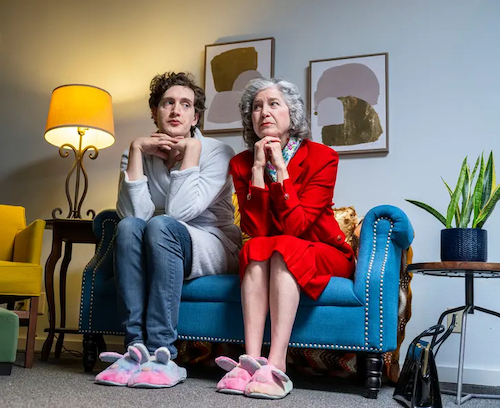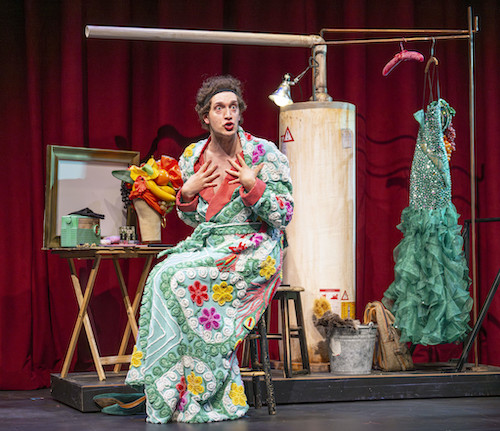
“There’s nothing I need from anyone except for love and respect. And anyone who can’t give me those two things has no place in my life.”
This resounding assertion of self-worth was first made by Arnold Beckoff, the force-of-nature drag queen character written and originally played by Harvey Fierstein in his 1981 sentimental comic opus “Torch Song Trilogy.”
More than four decades later, these lines should draw snaps and hosannas once again when Fierstein’s streamlined 2017 revision of the show, retitled simply “Torch Song,” makes its Bay Area debut at the Marin Theatre Company beginning May 9.
Fierstein has trimmed and tightened his original for the age of attention deficit. The once four-hour-plus running time has been reduced to a quick-moving two hours and 30 minutes.
Evren Odcikin, director of the Marin production, was born the same year that “Torch Song Trilogy” debuted off-Broadway. He wasn’t familiar with the work until reading it in the 2000s, sometime after graduating from Princeton University.
Shifts and recurrences
“I feel like the play is both a period piece and also a work that’s remarkably current,” explained Odcikin, who identifies as queer, during a recent interview with the Bay Area Reporter.
“For a moment, earlier in the 2000s, it felt like there had been huge moves forward in queer rights, and there have, but now we’re experiencing this backlash.”
Odcikin pointed out that, in the 1970s Manhattan milieu of “Torch Song,” Arnold is viewed by much of the gay community (and, in darker moments, by himself) as the low man on the homo totem pole.
At the height of clone conformity (blue jeans, leather jackets, flannel), an unabashedly effeminate gay man who does drag was subject to disdain and othering by the status queer.
“In some sense, with the popularity of ‘RuPaul’s Drag Race,’ drag queens have moved more toward the mainstream of gay culture,” observed Odcikin. “But there is also this demonization of drag going on in the larger society.”
Drag is just one aspect of queer culture that takes on multivalent, multigenerational resonance in “Torch Song.”
Another is casual, anonymous sex.

Sex-positivity
“I’m very curious to see the audience reaction to the backroom sex,” said Odcikin, referring to an early scene in which Arnold ventures into a bar’s dark room seeking close encounters.
While not visually explicit, what’s left to the imagination will be extremely easy to imagine, thanks to Odcikin’s direction, Fierstein’s uproarious dialogue, and the physical comedy of Marin’s lead actor, Dean Linnard.
“In the post-Stonewall, pre-AIDS period of the play,” said Odcikin, “spaces like this were a really important part of gay culture, places to feel comfortable exploring your sexuality.”
Gay audience members who came of age with PrEP may be nonplussed by the scene and even find it exhilarating. But for audience members old enough to have lived through the AIDS epidemic, the vignette may evoke very different feelings as a harbinger of darkness.
And, of course, the theater, in suburban Mill Valley, surely has some conservative subscribers.
Perspectives on progress
Ironically, “conservative” was one of the terms that some LGBTQ reviewers used to critique the original “Torch Song Trilogy.”
Its indelible dark room scene aside, the play advocates for monogamous gay relationships and for same-sex couples’ adoption of children, which factions of the queer community viewed as problematically heteronormative and insufficiently progressive.
That said, Fierstein’s vision fairly accurately foreshadowed the arguments and movements that ultimately led to expansion of queer American civil rights in the 21st century.
“I think he’s incredibly smart,” said Odcikin of the playwright, “in the way he leaned into familiar ideas and structures in order to help gain acceptance for gay people, who were not at all mainstream at the time.”
“Torch Song” offers an opportunity for queer audiences of all ages to reflect on the commonalities and differences of our experiences.
Consider crossing the bridge to Marin to build generational bridges within our community.
